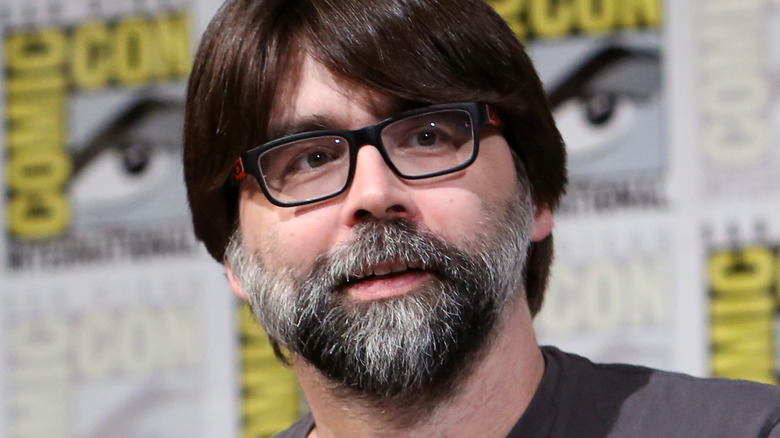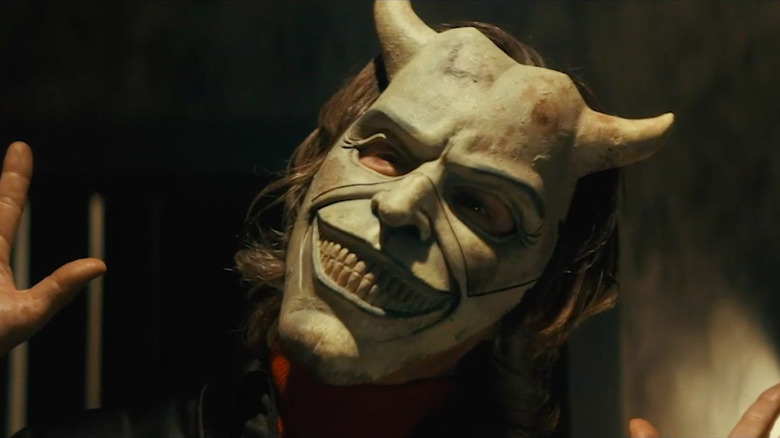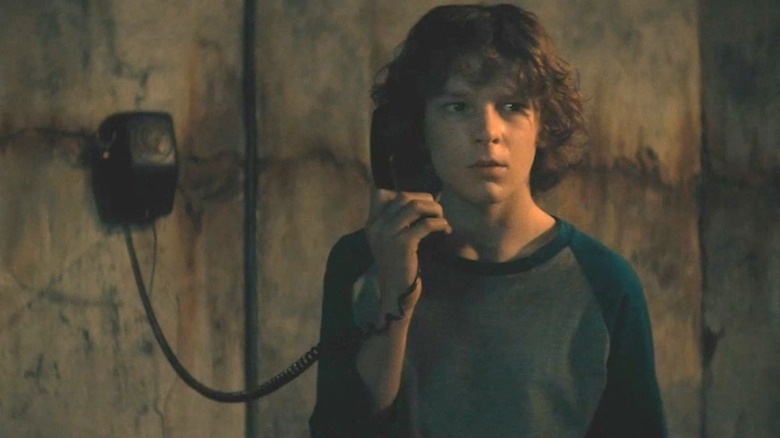The Black Phone's Joe Hill Describes The 'Three Flavors' That Came Together In The Film - Exclusive
Movie adaptations of existing stories can be tricky. It's almost impossible not to compare the book and the movie — and to be disappointed by one of them. That's not an issue for "The Black Phone," which is based on the unnerving short story by Joe Hill. Co-writers C. Robert Cargill and Scott Derrickson, who also directed the film, were incredibly faithful to Hill's story, but they also used its brevity as an opportunity to expand upon it, adding in additional character development and story details that make the story even more potent and absorbing.
"The Black Phone" centers on 13-year-old Finney (Mason Thames), the latest child to be kidnapped by a killer called The Grabber (Ethan Hawke). While being held captive in a barren basement, Finney receives calls from the ghosts of The Grabber's previous victims on the disconnected title phone, who give him clues about how to save himself. It's a chilling scenario made all the more nail-biting by the way the movie lets viewers get to know Finney and his family before his abduction. Hill was thrilled with the additions contributed to the story by Cargill and Derrickson, and in an exclusive interview with Looper, Joe Hill explained how his short story came together with their vision to create an "emotionally satisfying" film.
Expanding on the short story
Joe Hill observed that while C. Robert Cargill and Scott Derrickson were very faithful to his short story, there wasn't enough material there for an entire feature. "The film is incredibly faithful to the short story. Every line of dialogue in the short story is in the film," Hill reflected. "Every scene in the short story is in the film, but that's only like 40 minutes of the film. ... So there's a lot more there. Everyone brought something to it that I think helped make it a really satisfying picture."
Hill shared that Derrickson's experience with life in the Midwest in the 1970s made the movie especially realistic. "Derrickson grew up in north Denver, in the dirty, violent 1970s, and a lot of the film's very autobiographical about what that was like," Hill revealed. "It's sort of anti-nostalgia. I love that because I adore 'Stranger Things' ... but I'm not sure that the early '80s and late 1970s actually did look like a Spielberg movie all the time. The kids weren't actually mostly like Spielberg kids, precocious and clever and always quick with the witty line and stuff like that. It wasn't necessarily like that."
'The frosted peanut butter cupcake that is The Black Phone'
Meanwhile, C. Robert Cargill realized Joe Hill's story lent itself to an escape room structure. "In the short story, The Grabber takes Finney to lock him into his basement with this disconnected antique phone. And then Finney gets calls from Bruce Yamada, the ghost of a friend who was killed by The Grabber months before. ... I think that's the only ghost to call on the phone," Hill explained. "What Cargill brought to it was all The Grabber's victims use that phone to call Finney, and they each have another suggestion for how he might escape. ... That's all Cargill. Cargill looked at the short story and said, 'This is an escape room.' ... How does Finney get out? What clues does Finney need to solve? What puzzles does Finney need to solve to get out of that room?"
As a result, "The Black Phone" is the work of three creative minds each contributing something vital to the final film. As Hill noted, "Those are the three — the original short story, Cargill's escape room structure, and Scott Derrickson's very personal autobiographical stuff about childhood in the '70s — those are the three flavors that came together to make the frosted peanut butter cupcake that is 'The Black Phone.'"
"The Black Phone" is now available on digital, Blu-Ray, and DVD.


